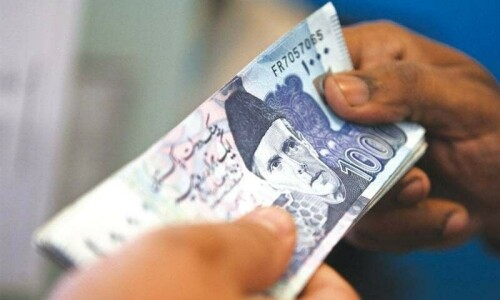 The current economic imbroglio has been blamed on the ‘irresponsible’ fiscal behaviour of the federal government. It leaned too much on the central bank to wedge the gap between the government income and expenditure, upsetting the economic apple cart in the process. While the revenue shortfall has been analysed, the pattern of spending has not attracted the focus it deserves.
The current economic imbroglio has been blamed on the ‘irresponsible’ fiscal behaviour of the federal government. It leaned too much on the central bank to wedge the gap between the government income and expenditure, upsetting the economic apple cart in the process. While the revenue shortfall has been analysed, the pattern of spending has not attracted the focus it deserves.
What it means is that there is a lot of debate on options available for resource generation to achieve ‘economic stability’ and to avoid the easy option of bank borrowing but little has been said on the manner costly resources raised from the central bank were spent by the Musharraf/Shaukat Aziz, interim and the elected governments.
It has been argued that the previous government did not pass on the burden to people and resorted to excessive internal borrowing to absorb the impact of rising oil and commodity prices in 2007 for reasons of political expediency. That Musharraf/Aziz coterie failed to draw political mileage from what donors consider to be economically unsustainable populist policies is another matter.
The policy was reversed after the elected government was compelled to contain the financial mess by slashing multiple subsidies and passing on the impact of international price hike by revising upward the price of petrol products and limiting the subsidy to bare essentials. But the strong borrowing continued unabated till October last year. The macro indicators kept slipping and by the end of 2008 the government was forced to seek the IMF credit facility that entails tough conditions.
If certain people have really been so reckless shouldn’t they be called upon to explain their position? Or if the onset of events is too fast or the challenges ahead too grave to spare time and energy for the past, the least the government can do is to blacklist top 10 people of the last economic team.
Quite a few of top ranking economic managers continue to bask in sunshine enjoying the perks of cushy positions in the current set-up. “There is a need to purge the economic ministries of such elements to discourage inefficiency or dishonesty at the highest levels in the economic management”, an angry senior bureaucrat said casting his doubt over the seriousness of the current team that, he said, comprises many members of the old squad.
Others, however, feel that under the circumstances, the previous government did what any government would have done. “In effect what the critics of the last government are saying is to have allowed the masses take the full brunt of the oil and commodity price hike when the country was already bearing the pain of transformation-- political turmoil all through 2007.
It is one of the functions of the central bank to support the government by lending in extra ordinary circumstances. Much of Rs640 billion borrowed from the bank has been spent on subsidies. Yes I own policies of the last government”, said a member of Shaukat Aziz dream team talking to Dawn ready to own policies but not his comments.
Dr Shamshad Akhtar, ex governor State Bank was not too convinced. In her message in the SBP Annual Report 20007-2008 she said: “Financial management weaknesses surfaced more glaringly as the budget for 2007/08 was observed to be grossly underestimated and the spending was not aligned properly to the resource availability……., the fiscal gap rose as the country had to bear higher than budgeted interest and subsidies expances that together rose to 8.4 per cent of GDP.
The fiscal deficit turned out to be 7.4 per cent GDP, which was almost 3.4 per cent above the budget target”. The report is much milder towards the government that assumed power after elections in 2007.
It would be apt to analyse the composition of the federal budget of the period of deficit financing to be able to form an opinion on the merit of the policy adhered to during 2007 and 2008 under three governments.
The State Bank’s voluminous annual report 2007-08 has assigned two pages on its commentary on spending. It attributed upsurge in the current expenditure to interest payment on domestic debt and defence. It identified current subsidies that were quadrupled from less than one per cent of the GDP in FY07 to 3.7 per cent of the GDP in FY08.
The current Pakistan Economic Survey shifts gaze from economic mismanagement of the year under review. It clubbed economic performance over the past 11 years and commented more on averages and trends.
Where it was dealing with the issue of public spending, the survey commented: “…Consequently, the share of current expenditure in total expenditure has declined from 89 per cent in 1999-00 to 82.3 per cent in 2006-07”. It said: “Total expenditure grew by 1.4 per cent in the first four years (2000-04) of the current decade but accelerated to 10.9 per cent during the last four years (2004-08). The main contribution came from development expenditure which grew by 9.4 per cent per annum during the first four years (2000-04) and by 27.2 per cent in the recent four years (2004-08).
Current expenditure grew by 0.14 per cent on average in the first four years (2000-04) of the decade, mainly on account of a sharper decline in interest payments and a marginal
contraction in defence spending. During the last four years (2004-08) current expenditure in real terms grew by 7.4 per cent mainly on account of a sharper increase in interest payments and a moderate growth in defence expenditure.”
Without much ado it summed up the discussion: “The government’s plan of better fiscal transparency and improving expenditure management is still at the forefront of policy despite the impediments during this fiscal year. The total expenditure of the government has remained more or less stable in a narrow band of 17 to 18 per cent of GDP”.
The creative accountants must have worked overtime to mask the visible wastage of public money by the Musharraf’s government on PML(Q) electioneering campaign and mindless extravagant spending by kingpins hidden from public eye. This was over and above the faulty defective prioritisation of sectoral support in the budget. The globe trotting by the current political hierarchy with jet loads of friends and family entails cost but the diplomatic or economic gains are hard to fathom. Even the closest of friends showed reluctance to provide unconditional financial support.
The advisor to prime minister on finance Shaukat Tareen at a recent private sector function in Karachi, responding to the complaints of businessmen said there could be no growth without stabilisation. He also explained to the depressed crowd of Korangi Association of Trade and Industry that it was “…the borrowing of the government from the central bank and excessive imports that led to hyper inflation and trade imbalance. That built pressure on foreign exchange reserves and the resultant drawdown on currency”.
The hope of better resource generation from a slowing economy looked misplaced. Slashing development expenditure would deepen the crisis as new investment is desperately required. It would help the government identify corners that can be cut to suit its size if the government accounts are made more transparent.















































Dear visitor, the comments section is undergoing an overhaul and will return soon.